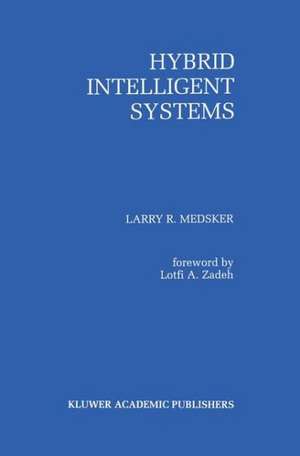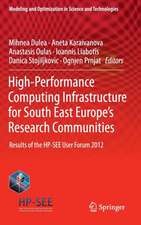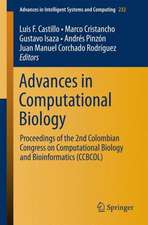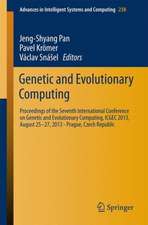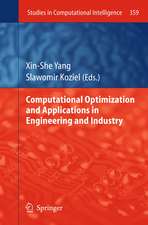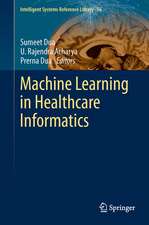Hybrid Intelligent Systems
Autor Larry R. Medskeren Limba Engleză Paperback – 21 oct 2012
The book starts with a summary of the five major intelligent technologies and of the issues in and current status of research into them. Each subsequent chapter presents a detailed discussion of a different combination of intelligent technologies, along with examples and case studies. Four chapters contain detailed case studies of working hybrid systems. The book enables the reader to:
- Describe the important concepts, strengths and limitations of each technology;
- Recognize and analyze potential problems with the application of hybrid systems;
- Choose appropriate hybrid intelligent solutions;
- Understand how applications are designed with any of the approaches covered;
- Choose appropriate commercial development shells or tools. An invaluable reference source for those who wish to apply intelligent systems techniques to their own problems.
| Toate formatele și edițiile | Preț | Express |
|---|---|---|
| Paperback (1) | 988.00 lei 6-8 săpt. | |
| Springer Us – 21 oct 2012 | 988.00 lei 6-8 săpt. | |
| Hardback (1) | 994.26 lei 6-8 săpt. | |
| Springer Us – 30 iun 1995 | 994.26 lei 6-8 săpt. |
Preț: 988.00 lei
Preț vechi: 1235.00 lei
-20% Nou
Puncte Express: 1482
Preț estimativ în valută:
189.06€ • 202.16$ • 157.63£
189.06€ • 202.16$ • 157.63£
Carte tipărită la comandă
Livrare economică 18 aprilie-02 mai
Preluare comenzi: 021 569.72.76
Specificații
ISBN-13: 9781461359982
ISBN-10: 1461359988
Pagini: 316
Ilustrații: XIV, 298 p.
Dimensiuni: 155 x 235 x 17 mm
Greutate: 0.45 kg
Ediția:Softcover reprint of the original 1st ed. 1995
Editura: Springer Us
Colecția Springer
Locul publicării:New York, NY, United States
ISBN-10: 1461359988
Pagini: 316
Ilustrații: XIV, 298 p.
Dimensiuni: 155 x 235 x 17 mm
Greutate: 0.45 kg
Ediția:Softcover reprint of the original 1st ed. 1995
Editura: Springer Us
Colecția Springer
Locul publicării:New York, NY, United States
Public țintă
ResearchCuprins
1 Overview of Intelligent Systems.- 1.1 Expert Systems.- 1.2 Neural Networks.- 1.3 Fuzzy Systems.- 1.4 Genetic Algorithms.- 1.5 Case-Based Reasoning.- 1.6 Intelligent Information Systems.- 1.7 Summary.- 1.8 References for Further Reading.- 2 Research in Hybrid Intelligent Systems.- 2.1 Models for Integrating Intelligent Systems.- 2.2 Hybrid Reasoning — Issues and Research Areas.- 2.3 Development Tools.- 2.4 Future of Research and Development.- 2.5 References for Further Reading.- 3 Expert Systems and Neural Networks.- 3.1 Expert System and Neural Network Technologies.- 3.2 Hybrid Neural Network and Expert Systems.- 3.3 Development Tools and Environments.- 3.4 Conclusions and Assessment of the Future.- 3.5 References for Further Reading.- 4 Industrial Experience: The Use of Hybrid Systems in the Power Industry.- 4.1 The Changing Face of the Power Industry in the United Kingdom.- 4.2 Artificial Intelligence in the Power Industry.- 4.3 Blyth Power Station.- 4.4 Condition Monitoring.- 4.5 The Application of Hybrid Systems in Condition Monitoring.- 4.6 Other Applications in the Power Industry.- 4.7 Conclusions.- 4.8 References for Further Reading.- 5 Expert Networks.- 5.1 Introduction.- 5.2 The Translation Process.- 5.3 Training for Performance.- 5.4 The Wine Advisor.- 5.5 The Control Chart Selection Advisor.- 5.6 Conclusions.- 5.7 References for Further Reading.- 6 Fuzzy Logic and Expert Systems.- 6.1 Characteristics of Expert Systems and Fuzzy Logic.- 6.2 Survey of Research and Development.- 6.3 Examples of Fuzzy Expert Systems.- 6.4 Intelligent Tutoring System.- 6.5 Fuzzy Control Systems.- 6.6 Development Tools and Environments.- 6.7 Summary.- 6.8 References for Further Reading.- 7 Fuzzy Systems and Neural Networks.- 7.1 Synergistic Features of Fuzzy Systems and NeuralNetworks.- 7.2 Summary of Research and Development Work.- 7.3 Development Systems.- 7.4 Summary and Guidelines.- 7.5 References for Further Reading.- 8 Genetic Algorithms and Neural Networks.- 8.1 Synergistic Characteristics.- 8.2 Summary of Research and Development Work.- 8.3 Examples Integrated Genetic Algorithms and Neural Networks.- 8.4 Development Systems.- 8.5 Summary and Guidelines.- 8.6 References for Further Reading.- 9 Applications Using Hybrid Neural Networks with Fuzzy Logic and Genetic Algorithms.- 9.1 Introduction.- 9.2 Hybrid Neural Network-Fuzzy Logic Diagnosis System for Vibration Monitoring.- 9.3 Decision Fusion by Fuzzy Set Operations.- 9.4 Genetic Algorithms to Select Inputs to Neural Networks.- 9.5 Summary.- 9.5 References for Further Reading.- 10 Genetic Algorithms and Fuzzy Systems.- 10.1 Opportunities for Integration.- 10.2 Examples of Hybrid Genetic and Fuzzy Systems.- 10.3 Summary.- 10.4 References for Further Reading.- 11 Adaptive Control of an Exothermic Chemical Reaction System Using Fuzzy Logic and Genetic Algorithms.- 11.1 Introduction.- 11.2 The Physical System.- 11.3 Genetic Algorithms Differ from Other Search Procedures.- 11.4 The Mechanics of a Simple Genetic Algorithm.- 11.5 An Adaptive Hexamine GA-FLC.- 11.6 Summary and Conclusions.- 11.6 References for Further Reading.- 12 Genetic Algorithms and Expert Systems.- 12.1 Synergistic Characteristics.- 12.2 Examples of Hybrid Systems.- 12.3 Summary.- 12.4 References for Further Reading.- 13 Hybrid Systems with Case-Based Reasoning.- 13.1 Opportunities for Hybrid Systems.- 13.2 Case-Based Reasoning with Other Intelligent Technologies.- 13.3 Summary.- 13.4 References for Further Reading.- 14 Summary and the Future of Hybrid Intelligent Systems.- 14.1 Intelligent Technologies.- 14.2 HybridIntelligent Systems.- 14.3 Research and Development Directions.- 14.4 Conclusions.- 14.5 References for Further Reading.- General References.- Hybrid Systems with Case-Based Reasoning.- Expert Systems and Fuzzy Logic.- Expert Systems and Neural Networks.- Fuzzy Logic and Genetic Algorithms.- Fuzzy Logic and Neural Networks.- Genetic Algorithms and Neural Networks.- References.
Recenzii
` ... is very readable, with clear illustrations, and provides an insightful, informative, and up-to-date account of the basic ideas underlying hybrid intelligent systems. ... provides a good source for gaining a better understanding of hybrid systems.'
Engineering Applications Artificial Intelligence, 10:1 (1996)
Engineering Applications Artificial Intelligence, 10:1 (1996)
